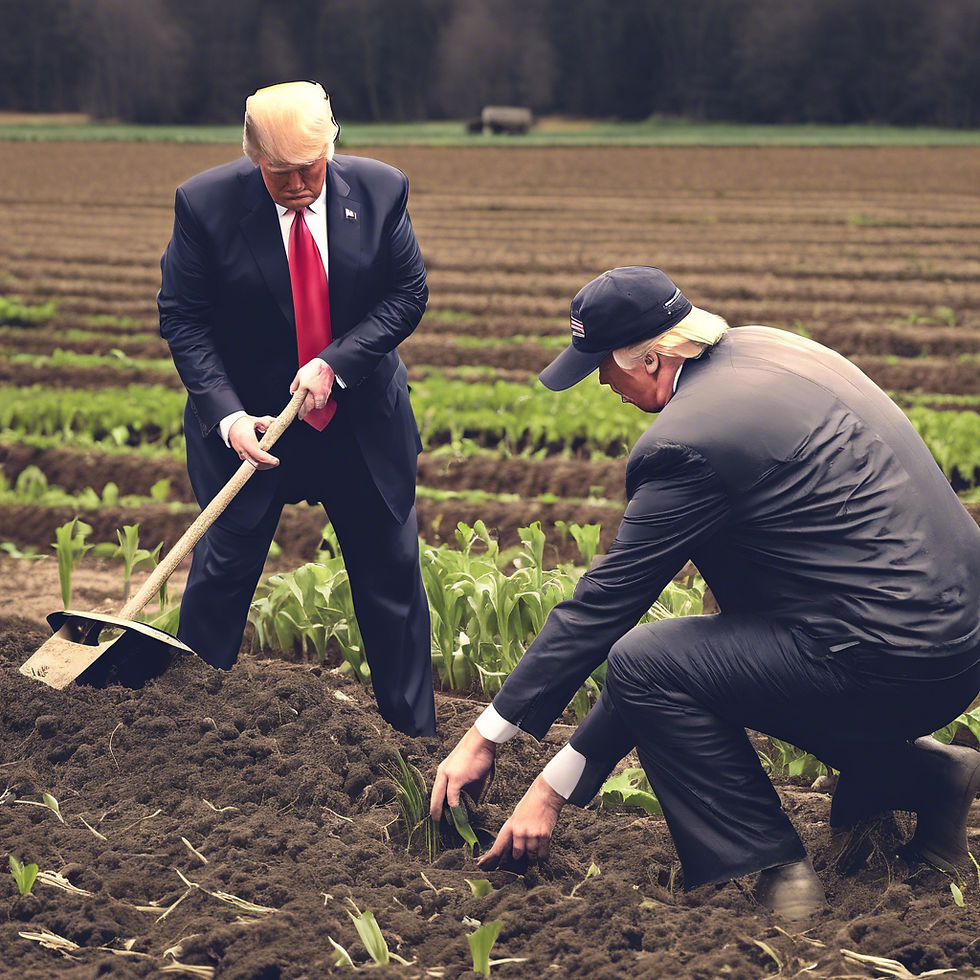Understanding the Federal Hold on Grants and Loans: Implications for USDA and Agriculture
- Malik Miller
- Jan 28
- 3 min read
The recent announcement by the Trump administration to impose a temporary hold on federal grants and loans has sent ripples across multiple sectors, including agriculture. This decision, intended to review and realign federal spending with the administration’s priorities, could significantly impact USDA programs, rural communities, and the broader agricultural industry. Below, we explore the potential consequences, challenges, and what this means for farmers and agricultural stakeholders.

What Is the Federal Hold on Grants and Loans?
On January 28, 2025, the Trump administration announced a pause on all federal grants and loans, excluding Social Security and Medicare. The stated goal is to conduct a comprehensive review of spending and ensure alignment with key priorities, including reducing what the administration perceives as inefficiencies or misaligned initiatives. This move applies to federal agencies across the board, including the USDA, which administers vital programs for farmers, rural development, and conservation efforts.
Key USDA Programs Affected
The USDA oversees numerous grant and loan programs essential for supporting agriculture and rural communities. The federal hold could delay or disrupt funding for:
Farm Operating and Expansion Loans:
Farmers seeking USDA loans for daily operations, equipment, or expansion may face significant delays, impacting their ability to maintain or grow their businesses.
Disaster Recovery Assistance:
Programs designed to support farmers recovering from natural disasters, such as hurricanes, droughts, or wildfires, could experience funding interruptions, leaving affected communities vulnerable.
Rural Infrastructure Development:
Loans and grants supporting rural infrastructure, including broadband expansion, housing, and water systems, may be paused, stalling critical development projects.
Conservation and Sustainability Efforts:
Programs like the Environmental Quality Incentives Program (EQIP) and the Conservation Reserve Program (CRP), which encourage sustainable farming practices and resource conservation, could be delayed.
Beginning Farmer and Rancher Programs:
New and aspiring farmers relying on USDA-backed loans and grants to start their operations may face barriers, potentially deterring the next generation of agricultural leaders.
Broader Implications for Agriculture
Economic Impact on Farmers and Ranchers
Delays in funding could strain cash flow for farmers, especially those operating on tight margins. This is particularly concerning for small and mid-sized farms, which often depend on USDA assistance to remain viable. Expansion plans, investments in technology, and equipment purchases may be postponed, affecting productivity and profitability.
Rural Development Challenges
USDA programs are a lifeline for rural America, supporting everything from infrastructure to business development. A prolonged pause could hinder economic growth and quality of life improvements in these communities, widening the urban-rural divide.
Food Security Risks
Disruptions in funding for food assistance programs like SNAP (Supplemental Nutrition Assistance Program) could exacerbate food insecurity for low-income families. Additionally, delays in agricultural research funding may slow innovation in crop resilience, pest management, and food safety.
Environmental and Sustainability Concerns
Programs promoting sustainable farming practices may face interruptions, potentially impacting long-term efforts to combat climate change and protect natural resources. Farmers participating in conservation initiatives may also experience setbacks due to delayed payments.
Responses and Next Steps
Advocacy for Exemptions
The USDA and agricultural stakeholders are likely to push for exemptions to protect critical programs. Farmers, rural leaders, and industry advocates should unite in emphasizing the importance of uninterrupted funding for agriculture.
Exploring Alternative Financing
Farmers may need to seek alternative funding sources, such as private loans, state programs, or industry partnerships, to bridge the gap during the federal hold.
Monitoring Legal Challenges
The federal hold is already facing criticism and potential legal challenges. State governments and advocacy groups argue that the pause could have unconstitutional or disproportionately harmful effects. The outcome of these legal battles may shape how the hold is implemented or rolled back.
Preparing for Delays
Farmers and agricultural businesses should plan for potential delays by reassessing budgets, prioritizing essential expenditures, and staying informed about policy updates.
Conclusion
The federal hold on grants and loans creates significant uncertainty for the USDA and the agricultural sector. While the administration’s review process aims to align spending with national priorities, the unintended consequences could ripple through rural communities, farming operations, and environmental initiatives. Farmers and stakeholders must stay vigilant, advocate for necessary exemptions, and prepare to adapt to this challenging environment. The coming months will be critical in determining the long-term impact of this decision on agriculture and rural America.

Yorumlar